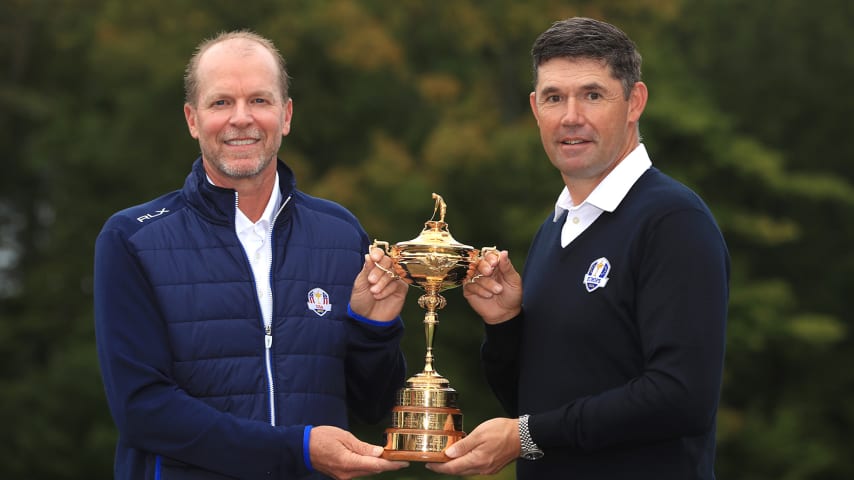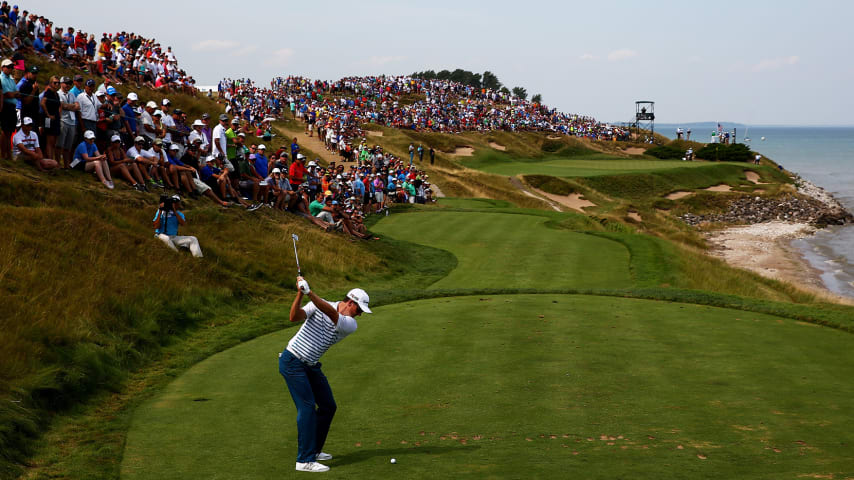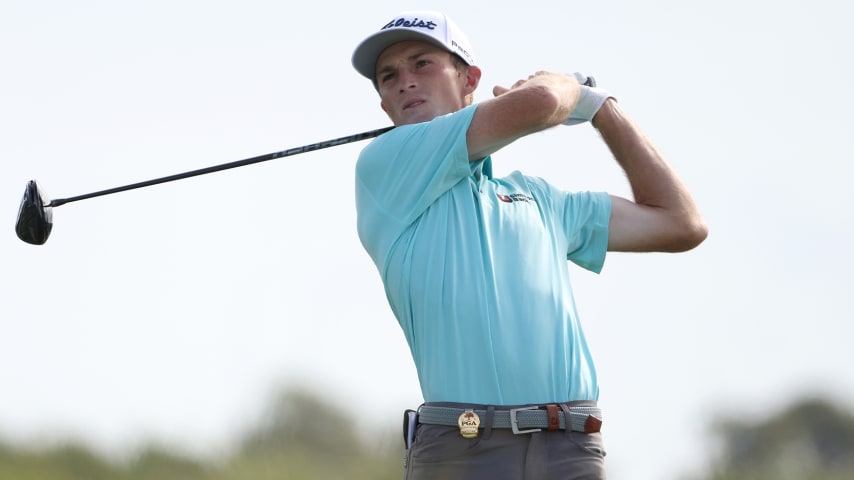Roundtable: Previewing this year’s Ryder Cup
7 Min Read

KOHLER, WISCONSIN - OCTOBER 01: United States Captain Steve Stricker (L) and European Captain Padraig Harrington pose with the Ryder Cup during the Ryder Cup 2020 Year to Go media event at Whistling Straits Golf Course on October 1, 2019 in Kohler, United States. (Photo by Andrew Redington/Getty Images,)
Written by Sean Martin
The 2021 Ryder Cup at Whistling Straits is finally upon us after the COVID-19 pandemic forced a year-long postponement. We can’t wait to see what the two teams bring to the table in Wisconsin.
The U.S. team is using a new-look lineup – featuring six rookies and three players making just their second appearance – to wrest the Ryder Cup from Europe’s grasp. The home team has an average age of just 29 years old. Eight U.S. players have yet to experience their 30th birthday.
The visiting team has taken an opposite strategy, leaning on successful veterans as they look to make it five wins from the last six attempts. With just three rookies, the Europeans have an average age of 34.6, ranging from 24-year-old Viktor Hovland to veteran Lee Westwood at 48. Eight of their team have already tasted Ryder Cup success.
To get you ready for the first Ryder Cup since 2018, we’ve come together to prognosticate over the important issues heading into the tournament.
What is the biggest question mark for each team?
Sean Martin: For the United States, it’s health. Brooks Koepka is coming off an arm injury, Collin Morikawa was hampered by a bad back in the FedExCup Playoffs and Bryson DeChambeau’s hands are being ripped apart by his long-drive training. Koepka’s status was uncertain until a couple days ago, but I do think – if he is indeed fully healthy – that we will get the best of Brooks, which will be a huge asset to the team. He was 3-1-0 in his lone home Ryder Cup appearance. And Paul Azinger’s comments that Koepka should relinquish his roster spot to someone with more passion will light a fire under Koepka. It reminds me of the 2019 PGA Championship, when Brooks responded to a brou-ha-ha with Brandel Chamblee by torching Bethpage Black to a first-round 63 en route to victory. Morikawa has had a few weeks to get right, and Steve Stricker has to hope he has because his post-Olympics injury really slowed his momentum after winning The Open. He missed the cut at the THE NORTHERN TRUST, finished T63 in the 69-man BMW Championship and shot the second-worst 72-hole score at the TOUR Championship. And let’s just hope that Bryson has been exfoliating.
Ben Everill: For the Europeans, the issue is whether or not veteran experience can make up for lack of firepower on a lengthy Whistling Straits in what promises to be a very hostile environment. With his side facing a rabid, partisan gallery that will lack European support because of travel restrictions, captain Padraig Harrington stacked the deck with old stagers who have seen it all before. But can captain’s picks Lee Westwood (0-3-0) and Sergio Garcia (1-2-2) perform better than in Hazeltine five years ago? They’ll have to.
Which player will surprise us?
Martin: Daniel Berger. I don’t think he’s gotten enough credit for his play since golf returned from its COVID-19 hiatus last year. He’s won twice in that span and been quite consistent. He also has the moxie necessary for this event, which Stricker cited as another reason he was selected for the team. “We know what we're getting: A great competitor, no weaknesses,” Stricker said. Berger has finished in the top 10 in the past two majors and is a quietly a top-20 player in the world. He could give Florida State fans something to cheer about after a difficult start to football season. And Berger secured the winning point the last time Stricker was the U.S. captain, at the 2017 Presidents Cup. I could see him playing a pivotal role again this week.
Everill: Viktor Hovland. Despite being a rookie for the European team I’m expecting Hovland to play in all, if not nearly all, matches. The young Norwegian will be a breakout star for his team and bring some serious energy and enthusiasm to the table. The key for Hovland will be his putter. He strikes the ball better than most, but he will need to convert his opportunities and roll with that confidence.
Who is the favorite?
Martin: I still think it’s the United States. It has outscored the Europeans, 47-37, in the past three Ryder Cups on home soil and is one historic European comeback in 2012 from sweeping the last three Cups in the United States. Being able to set up the course to suit their distance advantage definitely helps. And Ben is astute to point out that there will be a limited European presence in the galleries because of travel restrictions.
Everill: Europe. The U.S. Team usually always gets this slot pre-tournament thanks to a dominance on paper. For instance, the average world ranking for the Euros when both teams were finalized was 30 while the U.S. boasted an average ranking of 9! (They have players 2-7 and 9-11). The U.S. team has four FedExCup champions (including the current one) and The Open champion. Its 12-man roster has 13 major wins combined. The Europeans have two FedExCups (both McIlroy) and seven major wins in comparison.
BUT – all that means nothing at the Ryder Cup. Here’s the stats that matter. Europe have collected the Cup in 12 of the last 17 Ryder Cups; seven of the last nine and four of the last five. The European Team has a combined 38 Cups experience, winning 28 times. The U.S. has just 12 Cups of experience for 3 wins. Just three U.S. players have experienced winning the Ryder Cup and if things get close that could be the difference maker.
Who will be the man of the match?
Martin: Patrick Cantlay. The FedExCup champion and PGA TOUR Player of the Year will continue to assert himself on the big stages and see his star continue to rise. He arrives in good form, including a week spent holding off Europe’s top player, Jon Rahm, at East Lake. I think he and Xander Schauffele will form a formidable duo in the team formats and I trust him to succeed in singles. We’re seeing the Patrick Cantlay that we thought we would after his incredible summer a decade ago.
Everill: As mentioned above, I’m expecting a huge week from Viktor Hovland. He will be the catalyst of Europe’s victory. Now if… IF… the U.S. team finds their groove like they did under captain Stricker at the 2017 Presidents Cup… well I can see Justin Thomas being the man to lead his troops on the course.
Which rookie are you focused on?
Martin: Scottie Scheffler. He’s the only player on the U.S. team without a win, just completed his second season on the PGA TOUR and has never represented the United States as a professional. The 25-year-old performs well on big stages, qualifying for the TOUR Championship in each of his first two years and finishing in the top-20 in the last six majors, including three straight top-10s. But the Ryder Cup is a different animal and I’m interested to see how he performs.
Everill: I’ve singled out Hovland above so he will have plenty of my focus but outside of the Norwegian I want to see how Xander Schauffele performs. I’ll never forget the 2019 Presidents Cup in my home country when Schauffele noticed Adam Scott drop his head ever so slightly after an early lost hole. He pulled his caddie aside and said, “Now’s the moment. Now we go for the throat. While he’s down.” And two holes later he was 3-up and had stunned, and silenced, the Australian crowd. If he brings that sort of intensity to the Ryder Cup, he could be deadly in the competition for a decade.
Which singles match do you want to see?
Martin: Ben is right, Rahm-Cantlay is the easier answer. And we unfortunately can’t select Brooks-Bryson. I like the idea of Morikawa-Hovland as a battle between the two players who turned in 2019, as well as a redux of the memorable Arnold Palmer Invitational showdown between Bryson DeChambeau and Lee Westwood, which pitted the long hitter against the wily veteran. Finally, I’d like a showdown between the best players of the past decade, DJ and Rory. DJ was one rules infraction away from being in the playoff at the 2010 PGA at Whistling Straits and McIlroy finished third.
Everill: It would be easy to say Jon Rahm-Patrick Cantlay. That would give us a tasty return bout from the FedExCup finale… but personally I want to see Ian Poulter take on Xander Schauffele. As mentioned above, I believe Schauffele is a match play specialist waiting to break out and we all know Poulter is the match play ninja! This match-up would provide fireworks and theatrics.










